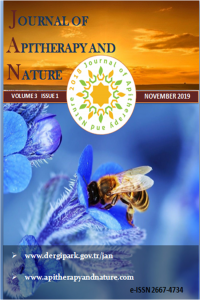
Journal of Apitherapy and Nature
Yazarlar: David G. WATSON, Harry de KONING, Godwin EBILOMA, John IgoLI, Weam SIHERI, Naif ALENZI, Samyah ALANAZI, Sameah ALENEZI, William HARNETT
Konular:-
Anahtar Kelimeler:Propolis,Anti-protozoal Effects
Özet: Propolis almost always has moderate to strong activity against protozoa, with the strongest activity being against trypanosomatids. It has become evident that protozoan infection in bees is widespread with Lotmaria passim, a monoxenous parasite transmitted via infection of the rectum and a close relative of Trypansoma brucei, being widespread in European bee populations 1, 2. We have studied anti-protozoal activity in propolis from Libya, Saudi Arabia and Nigeria and most recently in samples from the UK. Samples from the UK have widely varying levels of activity against both T.brucei and Crithidia fasiculata, which is closely related to Crithidia mellificae which infects the honey bee. Using orthogonal partial least squares modelling it was possible to see that the highest activity in the UK samples seems to be associated with the abundance of pinobanksin esters. In a separate study the immunomodulatory effects of propolis were studied and it was found that propolis extracts from Brazil and the UK were strong inhibitors of nitric oxide formation by primary macrophages stimulated with lipopolysaccharide. In addition the propolis extracts lowered TNF-1β levels and IL-6 levels. Metabolomic profiling of the macrophages indicated that propolis samples had a direct effect on the conversion of arginine into citrulline and the recycling of citrulline back to arginine via argininosuccinate.